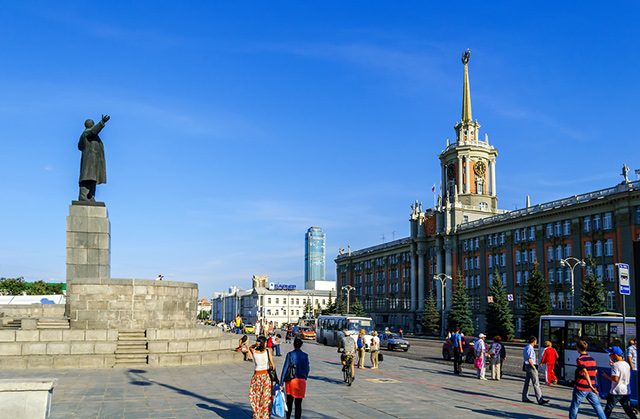SUMMARY
This is AI generated summarization, which may have errors. For context, always refer to the full article.

KIEV, Ukraine – Controversial laws designed to leave Ukraine’s Soviet past behind stoked tension in the war-divided country Friday, April 10 and prompted an angry reaction from Russia which called the ban on communist-era symbols “totalitarian”.
“Kiev used truly totalitarian methods, attacking freedom of the press, opinion or conscience,” the Russian foreign ministry said in a statement, also accusing Ukraine of “rewriting history”.
Ukraine’s parliament voted on Thursday, April 9 to ban communist-era and Nazi symbols in what supporters said was a bid to break with the country’s tragic World War II past and Moscow’s domination through most of the 20th century.
The measure, which was enacted quickly and with little debate, exacerbating tensions with pro-Moscow rebel forces who have seized control of a swathe of territory in Ukraine’s east.
The insurgents, who are alleged to operate with Russian military assistance, make a point of their attachment to the Russian-dominated Soviet era.
Russia said the law would “create divisions” and promote a “nationalist ideology”.
Moscow also honed in on the law’s controversial reference to nationalist Ukrainian guerrillas in World War II as “patriots”.
The Ukrainian Insurgent Army temporarily supported the invading Nazis before turning both on them and the Soviet army and ultimately being crushed by communist forces.
The Russian foreign ministry said Ukraine was “betraying millions of veterans” and trying “to extinguish the collective memory of millions of Ukrainians.”
The package of laws bans Soviet flags and means Soviet-era Lenin statues will have to be knocked down and town squares renamed across the country of some 45 million.
Historian David Marples at Canada’s Alberta University was critical.
“In the West, friends of Ukraine will have a difficult time accepting both the wisdom and timing of such a facile and asinine decree,” he said.
“The all-encompassing rejection of any facets of the Soviet legacy is troublesome,” Marples wrote. “The Red Army after all removed the Nazi occupation regime from Ukraine in alliance with the Western Powers.”
Soviet WWII veterans will be entitled to continue to wear their medals however, and graves will be left in peace, even if they are inscribed with the hammer-and-sickle or other Soviet insignia.
Law ‘a death wish’?
As fears mount of and end of the fragile ceasefire and resumption of the fighting in east Ukraine that has left more than 6,000 dead in a year, Marples said “it is hard to escape the conclusion that this acceptance into law is a major error, even akin to a death wish vis-a-vis the Donbas,” the name of the Russian-speaking industrial east.
The Ukraine parliament’s praise for the nationalist insurgents – whom Soviet authorities and today’s rebels in the east label fascist – was swiftly criticized by the eastern rebels. (READ: Ukraine rebels mark Soviet holiday for defenders of ‘fatherland’)
The move “will lead to the complete disintegration of the country”, warned one pro-Russian separatist leader, Alexander Zakharchenko.
“It causes disgust and revulsion. It formalizes the victory of fascism,” said the head of the self-proclaimed Donetsk People’s Republic.
But Kiev sociologist Andriy Bychenko said the parliament’s anti-Soviet drive was in tune with widespread belief that Russia is fueling the bloody rebellion in the east.
“Feelings towards the symbols of the Soviet Union have become sharply more negative since the beginning of the Russian aggression,” he told Agence France-Presse (AFP).
“A shining example” of that, he said, was the Communist Party’s flop at elections last year when it failed to win a single seat for the first time in the more than 20 years since Ukraine gained its independence in 1991.
During the 2014 Maidan protests that led to the ouster of then pro-Russian president Viktor Yanukovych and triggered Ukraine’s descent into conflict, there were frequent calls for a purging of Lenin statues. However for a significant minority of Ukrainians, especially in the east and in the Russian-annexed region of Crimea, pro-Russian and communist sympathies remain strong.
“This law embodies the mood after the Maidan, but it’s too radical,” said Volodymyr Fesenko of the Penta Center for Political Studies. “Not everyone will like it.” – Claire Rosemberg and Oleksandr Savochenko, AFP/Rappler.com
Building of the administration of Yekaterinburg and Lenin statue image from Shutterstock
Add a comment
How does this make you feel?
There are no comments yet. Add your comment to start the conversation.